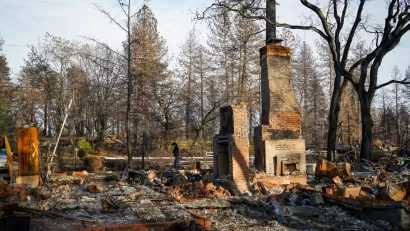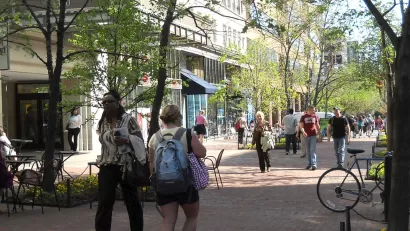The Daily Source of Urban Planning News

Renewable Energy Powers Entire State of California—for a Few Minutes
Last Saturday afternoon, thanks to a combination of high production and reduced consumption, California’s power needs were met almost entirely by renewable energy sources.

Study: Street Murals Can Prevent Crashes
An analysis of asphalt art around the country indicates that painted intersections and roads can dramatically improve pedestrian safety.

Pittsburgh Plans Pedestrian-Friendly Makeover on Downtown Street
Pittsburgh’s Smithfield Street could gain wider sidewalks, a bike lane, and more green space.

BLOG POST
RAISE Proposals Are in; What Will it Mean for Climate Change?
The deadline for the first discretionary program to accept applications since the Infrastructure Investment and Jobs Act was signed into law was April 14, marking the day as one of the most consequential in America’s response to climate change.

Fire-Ravaged Paradise Plans for a Resilient Rebirth
A new urban design plan calls for a robust buffer zone to protect the town from fast-spreading fires, among other mitigation measures.

Walkability Scores Don’t Tell the Whole Story
A new report concludes that common ‘walkability’ measures don’t account for many barriers faced by pedestrians, such as environmental factors and policing.

Superyachts Calling the Shots for How Light Rail Gets Built in Seattle
Determinations made by the Coast Guard to accommodate superyachts will affect the price of light rail and other bridge projects in Seattle and environs.

San Diego To Consider Tightening Regulations on E-Scooters
Proposed regulations would limit the popular micromobility devices to two operators, impose new fees, and require more accountability for safe scooter use and parking.

NFL Draft Inspires Proposal to Block Cars From the Las Vegas Strip
The NFL draft shut down the Las Vegas Strip to car traffic. Some people liked the change so much that a new law proposes to permanently block cars from the street. Yes, you read that correctly.

How Urban Sprawl Came To Dominate U.S. Cities—And How To Change That
The auto-centric development patterns of American cities are a result of decades of misguided, but reversible, policy decisions.

Houston Transit Ridership Highest Since the Pandemic Began
Ridership on Houston trains and buses rose sharply in March, thanks in part to the Houston Livestock Show and Rodeo and a limited return to offices.

Diverging Fortunes: Winners and Losers in the Pandemic Housing Market
The sharp rise in housing costs created massive wealth for property owners, while shutting many potential homebuyers out of the market.

PLANOPEDIA
What Is Automobile Dependency?
Automobile dependency is a term used to describe households who must rely on private vehicles for everyday transportation, often due to a lack of safe pedestrian infrastructure, ineffective or absent public transit options, and sprawl.

How Houston Is Growing its Bike Infrastructure
The famously car-centric city is investing more than ever in bike infrastructure, with ambitious plans to build 1,800 miles of protected bike lanes and trails.

Study: Transit Boards Don’t Reflect Their Ridership
Across U.S. cities, transit agency boards are overwhelmingly more suburban than their riders, causing a disconnect between decisionmakers and the people who regularly use transit.

Mayor Releases ‘One Fresno Housing Strategy’
The document outlines 47 policies aimed at maintaining affordability and encouraging more housing production in the increasingly expensive Central Valley city.

People Mover Proposed for San Diego Airport
The $4 billion project promises to connect San Diego to its international airport in under ten minutes.

Report: United States Could Cut Transport Emissions by 34 Percent by 2030
The U.S. transportation sector is on track to reduce emissions by 19 percent by the end of the decade, but a new report indicates the public and private sectors could implement policies that would cut emissions by as much as 34 percent.

Maine Passes Zoning Reform Laws
The state legislature passed two bills, one supporting accessory dwelling units and another incentivizing adaptive reuse, aimed at boosting housing affordability.
Pagination
planning NEXT
Appalachian Highlands Housing Partners
Mpact (founded as Rail~Volution)
City of Camden Redevelopment Agency
City of Astoria
City of Portland
City of Laramie
Urban Design for Planners 1: Software Tools
This six-course series explores essential urban design concepts using open source software and equips planners with the tools they need to participate fully in the urban design process.
Planning for Universal Design
Learn the tools for implementing Universal Design in planning regulations.



































